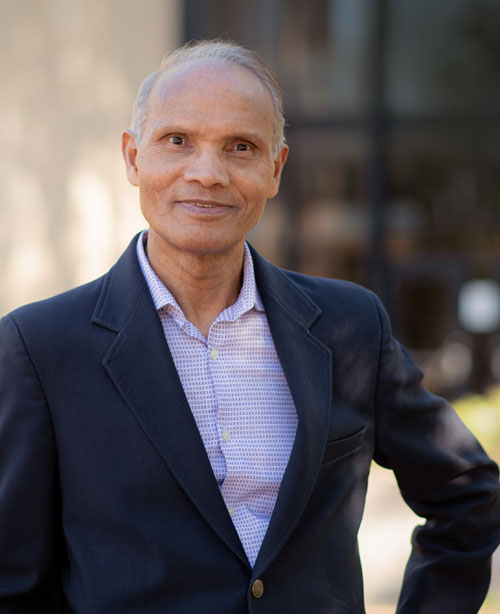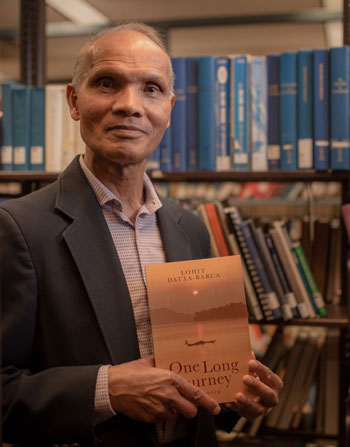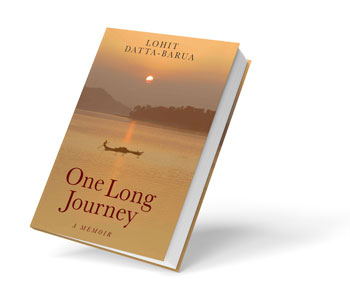By Sara Strong

At first look, the life Lohit Datta-Barua now enjoys seems to have little resemblance to his early years.
He is confident and comfortable, and retired since 2016 after a long engineering career in the oil-and-gas industry. He now dedicates much of his time to community service, his writing and his family, which now includes four grandchildren.
But life was not always so orderly for Datta-Barua (MSEE ’76, former Cullen College civil engineering instructor). His struggles to start a life in Houston in the 1970s would be beyond what was imaginable by most of his University of Houston classmates or professional engineering colleagues over decades that followed.
“Poverty is a fatal disease. You can die from it. But wealth can be a fatal disease, too,” he said.
Datta-Barua was born into deep poverty in India’s remote northeast. Every morning, his mother swept and washed the uneven dirt floors of the family home. At sunset, his daily chore was to gather the family’s few cows, which had a habit of wandering either the slum where the town’s beggars and lepers lived or a flea market where they incurred vendors’ wraths by helping themselves to produce in the stalls.
In the evening he studied by light of a kerosene lamp. Later, in the darkness, he gazed through holes in the roof to count stars in the sky. When the days permitted, he climbed atop a large rock on the south bank of the mighty Brahmaputra River, near his home. Perched there, he pondered life’s biggest questions. Then he listened to hear answers in the flowing waters.
In many ways, the important things in his life never changed.
The shy young Lohit from far away and the well-spoken Dr. Datta-Barua of today remain aligned in personal values. Each possesses the soul of a poet and the heart of a campaigner for social justice, especially on issues of poverty, education and women’s rights. And each is ready to tackle lofty goals one step at a time, even when odds pile up.

Datta-Barua’s newly released memoir, titled “One Long Journey,” examines his life story from the beginning to the current time. Its early tales relate the deaths of family and friends he held dear, the banishment of a beloved brother, and a young heart broken by the sharp divides of India’s caste divisions.
The stories tell of a gamble of a lifetime, recurring medical crises and, most riveting of all, a family secret so profound that its unraveling would shake his own sense of where he stood in the world.
The book reads like a page-turner of a novel, but it is the story of his life.
Datta-Barua’s first memories are of a father and a mother, five older brothers and two older sisters. They lived in the town of Guwahati in northeast India’s state of Assam, famous for its tea-growing plantations. Assam is also known for violent clashes with invaders, strife among separatist factions within, even defiance of national troops over handling of the region’s oil deposits.
Assam was an independent country until an 1826 treaty with Great Britain merged it into its colony of India. The political decision formed the famous “jewel in the crown” for the British Empire. For India, it imposed a new upper class at the very top of already strictly-divided social structure. The British left in 1947, but many of their social norms lingered.
Violence would return to Assam during Datta-Barua’s youth when China invaded India in 1962. Officially it was a border dispute, but most Indians saw it as vengeance for India providing sanctuary in recent years to Tibetan refugees, including the Dalai Lama and his followers.
With China’s People’s Liberation Army getting a foothold nearby, Datta-Barua and his young classmates received rifle training in the mornings. Afternoons, they helped evacuees temporarily housed in their school. Their own classes came later in the day in makeshift classrooms.
He worked diligently at his studies, always holding tightly to the promise that education would be his ticket out of Guwahati to a prosperous, more egalitarian life somewhere else.
By the time he graduated from the local school, a scholarship with a small stipend waited at a five-year engineering program at Birla Institute of Technology and Science, located in the town of Pilani in northwestern India.
The opportunity was excellent, but Pilani is almost 1,000 miles away from his family and his cherished Brahmaputra River, where he had listened for wisdom in his early years.
Settling into working hard in his studies at Pilani, he adapted to the distance and even grew to appreciate the desert sand of northwestern India almost as much as his beloved River back home. (The capitalization reflects Datta-Barua’s preference. In “One Long Journey,” he writes: “I don’t recall and can’t imagine my life without the River. I claim him as my River and honor him with a capital ‘R’.”)
When he earned a bachelor’s degree in electronics engineering in 1970, a professor urged him to immediately undertake Ph.D. studies in the United States, a suggestion so far-fetched it sounded like he was being told to relocate to the moon. Desperate for income, he accepted his first job offer instead.
For 300 rupees a month, he went to work for Bhava Atomic Research Center (BARC), and moved into the company’s dormitory-style housing in Mumbai (known then as Bombay to many English speakers). Officially, the project was for building nuclear power plants, but silently it also was part of India’s plan to develop nuclear weapons.
The cacophony of Mumbai, India’s second largest city, was worlds away from the lush tea fields of Assam and the quiet desert of Pilani. In his book, Datta-Barua writes:
“The densely populated city of Bombay was home to dreams ending in disappointment or worse, as well as dreams realized. Some people followed their dreams and came to be movie stars. Others never found work. Lured by the city lights, many ended up in the slums sharing space with street dogs and open drains. Then there were others who lived in Malabar Hills or Marine Drive, driving imported cars and drinking Scotch whiskey. Some, like me, were lucky to find a job to barely make a living in an expensive city.”
After just three months, a rescue came in the form of a job offer near Guwahati, his hometown, from the Pipeline Division of Oil India Ltd. (OIL). He would work with remote control, communication, automation, instrumentation, and radio/telemetry, even though he knew many of these systems only in theory.
His salary almost doubled. But far better, the move brought him near his widowed mother and siblings.
He was assigned to share a house with Dilip Deka, another new hire and an instant friend. Air conditioning and hired help for cooking, cleaning and gardening were unimaginable luxuries for both. Datta-Barua kept a used record player, received from an older brother, spinning with country-western music and Jim Reeves albums. And he struggled to settle into the company’s highly stratified society, all too reminiscent of the British colonial times.
The housing they were assigned – a Type D house design – sent a silent signal to everyone who worked and lived inside the company’s fenced-in compound: “We were officers of the most junior rank. Our immediate supervisors lived in Type D, E or F bungalows, depending on their job,” he said.
Top company officers were also granted Type F houses. Non-officer workers lived smaller, more sparse Type A, B or C homes.
One social club served only officers. Another was meant strictly for lower ranks. These invisible barriers were rarely crossed, at least not openly.
The job was enjoyable at first. At the Western-style Christmas, Santa Claus was helicoptered in. On New Year’s Eve, officers danced to Western music and enjoyed Western food. But for Datta-Barua, the glitter was quickly tarnishing.
A breaking point came in the fall, when the company’s annual sports event gathered employees from all nearby facilities. After the closing awards ceremony, the large crowd of participants and guests were treated to a poolside barbecue dinner. As grilled chicken burgers were handed out amid the laughter and music around the swimming pool, Datta-Barua happened to glance around the perimeter.
Just beyond, groups of children – in torn, dirty clothes and looking hungry – peered silently at the celebration through the tall chain-link fence.
“That could have been me. Not so many years before, I had been a poor boy with ragged clothes,” he said. “If I did not leave this job, I would become like the other officers, oblivious to the struggles of the people looking in from the outside.”
In his memoir, Datta-Barua writes: “I felt awful. I realized that I was getting sucked into a pseudo society while the real world lived outside the fence. In that instant I knew that I must get out before I got trapped.”
His ambition soon clarified. He would earn a master’s degree – not in India, but at a leading engineering program at a U.S. university.
But how? His father died when he was still a teen, leaving struggles for his widowed mother. There was no family savings and no collateral to secure a loan. His siblings were stretching their funds to provide for their young families.
Besides, he said, few Assamese Indians moved to the U.S. in those days. “Coming to America was beyond most people’s imagination, let alone coming here to go to school.”
His friend Dilip Deka was among those who did. Having left OIL and India, he was attending college in St. Louis, Mo. He offered advice: Look at state-funded schools for lower tuition, especially those in Texas.
After researching in the American Corner of the district library, Datta-Barua narrowed his choice to three. Austin, College Station – he had never heard of those cities. But Houston? Everyone recognized the message “Houston, the Eagle has landed.”
So the decision was made: He would study engineering at the University of Houston. But there were immediate problems.
“The UH application fee was $15, which I did not have. I wrote to my friend in St. Louis, asking him to pay the fee for me. In exchange, I would pay his father the equivalent amount in Indian rupees, which I did later,” he said. That left the larger challenges of getting accepted into the Cullen College plus raising the first semester’s tuition, travel costs from Guwahati to Houston, and living expenses until he could get a job.
“I begged any close friends and family to loan me money, whether it was 300 rupees or 500 rupees, or whatever they could provide,” he said. (In the early 1970s, $1 was equivalent to 7 rupees.)
After much effort, he finally landed in Houston with $7 in his pocket and a bank draft for one semester’s tuition. Two years later he returned home to see his ailing mother and to see his love of many years. He was heartbroken when his love was rejected because of caste difference.
But new and risky adventures brought happiness, such as his arranged marriage in August 1975 to Manjula (MSEE ’79), a beauty who valued education as he did. Her father introduced the couple just three days before the wedding and they agreed to marry, perhaps the biggest gamble of their lives.
“I came back to Houston with a stranger,” he said. “And I love her very much.” Now married 44 years, they would work as their family and careers prospered. Through the years, they would travel much of the world with the two daughters they raised in north Houston.
In their early time together, they fulfilled a promise to her father that Manjula would continue her education beyond the bachelor’s degree in physics she earned in India. In 1979, she graduated with her own electrical engineering master’s degree from the University of Houston and soon began her long career in the electric power industry.
Other experiences were harsh. Work hours were long, especially in the beginning. Income was minimal, and prejudice and frustrating bureaucracy were inescapable.
There was tragedy, too. Datta-Barua was behind the wheel on March 21, 1977, when a predawn accident took the life of friend, boss and academic mentor Dr. Randolph Blumberg (UH assistant professor of civil engineering). They had been on their way to an offshore drilling site in Louisiana.
“I didn’t care for anything anymore,” he said. “My wife and our friends stood by me.”
Datta-Barua eventually would regain his strength with their support and progress through an impressive engineering career in the oil-and-gas industry.
He finds time for helping the community, too, by volunteering in his neighborhood elementary school, and he has helped the End Hunger Network. In India, he is trying to set up a solar power system that will save ongoing high costs of electricity at a girls orphanage, Assam Sishu Kalyan Sadan (Assam Child Welfare House). He has participated in the MS 150 biking fundraiser and climbed Mount Kilimanjaro in support of charity.
“I have been helped and I want to help, through the book and otherwise,” he said.
Back in Assam, just as the waters of his River keep on flowing, so too has his family’s story. His beloved mother died in 1975; other family members have passed, too. Nieces and nephews were born, and many would pursue ambitious goals of their own.
Eventually, Datta-Barua would come to embrace a central truth of his survival, thanks in part to an unexpected message of hope and desperation that came to him through the generations. In childhood, he had mistaken it as merely a signature and notes left by a stranger inside a book that was among items his mother cherished for reasons unspoken. As an adult, he came to know those things were part of his own story, too.
Like the stranger, Datta-Barua would position education as the keystone in his life but sometimes would find himself battered by forces he could not control. Each would hold loved ones close, and each would turn to the power within waters of the mighty Brahmaputra.

Datta-Barua ultimately triumphed, perhaps helped on the journey by wisdom gained from the generation before. His search, in the end, carried him onward to a place of safety and peace – just like his River, which always flows forward.
Datta-Barua’s memoir, “One Long Journey,” is available worldwide from Amazon and from distributor IngramSpark. All proceeds from its sales help fund welfare projects for orphans.
Among his 11 books are two others for general audiences: “A View Through My Window,” inspired by his travels, and “Color of Life,” a collection of short stories. His writings for technical readers include “Natural Gas Measurement & Control,” and “Digital Computers: Repair & Maintenance.”
He has also published five works in the Assamese language.